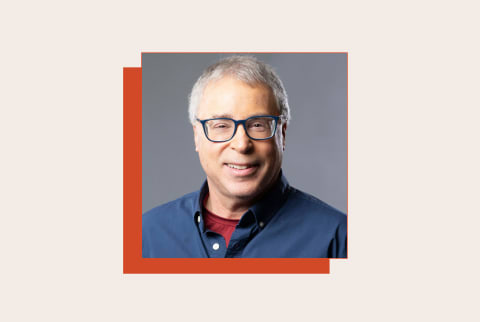Advertisement
Can This Diabetes Drug Delay Age-Related Diseases?


If we had a drug that could delay aging—would you take it?
According to renowned longevity researcher Nir Barzilai, M.D., author of Age Later, that longevity drug does exist, and it's more accessible than you think. Barzilai is the author of over 270 peer-reviewed scientific papers, including clinical data1 that shows the drug metformin (yes, the drug used in patients with Type 2 diabetes) has the ability to delay the hallmarks of aging—and that's what we're going to focus on below.
"Metformin is a gerotherapeutic. It targets the hallmarks of aging," Barzilai shares on this episode of the mindbodygreen podcast. "It's an antidiabetic drug, but not really. It started as a [longevity] drug from the beginning."
Ahead, discover why Barzilai believes this drug will transform the aging process and who's actually the best candidate (note: It's not everyone).
Metformin & aging
Metformin is commonly used to treat Type 2 diabetes, as it helps lower glucose and improve metabolism. And metabolic health status, Barzilai notes, is one of the biggest hallmarks of aging. After all, regular blood sugar spikes (i.e., lack of blood glucose control) can be a risk factor for many long-term health effects, including Alzheimer's disease, dementia, cancer, cardiovascular disease, and so on.
"People with metformin have less cardiovascular disease. They have less cancer. They have less Alzheimer's.2 They have less mortality3," Barzilai says. "It's not only about metabolism; you fix other things."
But how does it work? Well, Barzilai found that metformin can decrease the growth factor IGF-14, which manages growth hormone (GH) in our body. You might think this is a bad thing, but growth hormones are good for us when we're young and in our reproductive years. "Until the age of 40, the higher this growth hormone, the more you're protected from a variety of diseases and even mortality," Barzilai explains.
But once you cross that threshold, you don't necessarily want your body focusing on growth—you want it to focus on preventing breakdown. According to Barzilai, 60% of the centenarians he's studied have a gene that impairs the action of this growth hormone5—so the fact that metformin can perform a similar action may be a good thing, indeed.
He references another study that aimed to discover how metformin affects muscle mass and strength in participants over 65. Half of the participants went on metformin, and half did not. After they engaged in resistance training, both groups had increased their muscle mass—but the metformin group experienced less muscle growth (likely due to metformin blunting the IGF-1 response, along with some other mechanisms like inhibiting mTORC1, a protein that regulates protein synthesis).
Again, you might consider this bad news. But Barzilai explains that the metformin group actually had the same amount of strength, despite having smaller muscles. "They did four tests for force—getting out of a chair and lifting—and it was the same," he shares. "Every gram of muscle must have been stronger because they were doing just as well with and without metformin… So they had smaller muscles but better quality."
For all of these reasons, Barzilai is leading a trial (the TAME trial) to show the FDA that this drug can prevent a cluster of age-related diseases in elderly people without diabetes.
A few caveats
These findings are impressive, but that doesn't mean everyone is the right candidate for metformin. First things first: "All those studies have been done in people over the age of 50," Barzilai notes. So if you're in your 30s and 40s without Type 2 diabetes, metformin is likely not the best choice for you.
Again, when you're young, you don't want to inhibit growth hormones like IGF1. "Not everything that's good for you when you're old is good for you when you're young," Barzilai reminds us. "I wouldn't do it before the age of 50 unless you biologically have accelerated aging or have diabetes or prediabetes."
Even if you are over 50, you'll want to assess your own healthy aging process before jumping right into pharmaceuticals. "I wouldn't use it on somebody who's [naturally] going to be a centenarian," says Barzilai.
Meaning, if you're someone who doesn't have any hallmarks of aging, there's no reason you should take the drug that treats those conditions. "You have to have something. [Maybe] you had a heart attack. Maybe you're a cancer survivor. Maybe you walk slowly. You have to have something that shows that you're actually on the breakdown part of aging," says Barzilai.
Everyone ages differently, and some people reach centenarian status with nothing but lifestyle interventions. But for those who may need extra help, Barzilai says that's where the drug can come in handy.
The takeaway
Look, lifestyle interventions (nutrition, diet, sleep, etc.) are always crucial when it comes to extending health span. But depending on your genetic makeup, lifestyle may only get you 80% there—Barzilai's work shows that certain pharmaceuticals can get us closer to that 100%, and I think that's fascinating. Tune in to the full episode, and I'm sure you will too.
We hope you enjoy this episode! And don't forget to subscribe to our podcast on iTunes, Google Podcasts, Spotify, Amazon Music, or YouTube!
Watch Next
Enjoy some of our favorite clips from classes
Enjoy some of our favorite clips from classes
What Is Meditation?
Mindfulness/Spirituality | Light Watkins
Box Breathing
Mindfulness/Spirituality | Gwen Dittmar
What Breathwork Can Address
Mindfulness/Spirituality | Gwen Dittmar
The 8 Limbs of Yoga - What is Asana?
Yoga | Caley Alyssa
Two Standing Postures to Open Up Tight Hips
Yoga | Caley Alyssa
How Plants Can Optimize Athletic Performance
Nutrition | Rich Roll
What to Eat Before a Workout
Nutrition | Rich Roll
How Ayurveda Helps Us Navigate Modern Life
Nutrition | Sahara Rose
Messages About Love & Relationships
Love & Relationships | Esther Perel
Love Languages
Love & Relationships | Esther Perel
What Is Meditation?
Box Breathing
What Breathwork Can Address
The 8 Limbs of Yoga - What is Asana?
Two Standing Postures to Open Up Tight Hips
How Plants Can Optimize Athletic Performance
What to Eat Before a Workout
How Ayurveda Helps Us Navigate Modern Life
Messages About Love & Relationships
Love Languages
Advertisement

This Type Of Fat Is Vital For Women's Health — Are You Getting Enough?
Molly Knudsen, M.S., RDN

New Study Confirms The 3 Habits That Age Your Brain Faster
Molly Knudsen, M.S., RDN

This Type Of Fat Is Vital For Women's Health — Are You Getting Enough?
Molly Knudsen, M.S., RDN

New Study Confirms The 3 Habits That Age Your Brain Faster
Molly Knudsen, M.S., RDN













